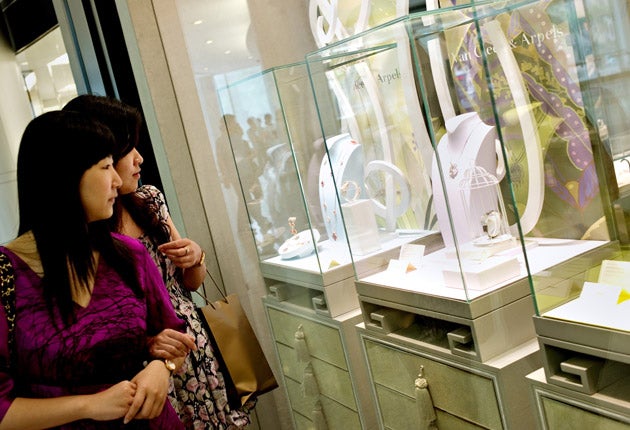China: Land of the rising middle classes
Fund launch looks to make the most of the country's newly minted professionals. Julian Knight reports

Difficult to define, often derided (not least by themselves) the middle class is at the centre of the world economy consuming the goods and services which keep the whole show on the road.
And over the next 20 to 30 years there is going to be a massive increase in the numbers of the world's population defined as middle class, thanks to the economic growth of Brazil, Russia, India, and especially China (the Bric countries). By the end of the decade, China for instance will have more people defined in terms of their average income as middle class than the combined populations of France and the UK. And there is no middle-class angst in this oldest of societies, they are getting richer and looking to spend.
"The growth of the Chinese and other Bric countries' middle class is one of the main economic stories of today and the next generation. It is a long-term phenomenon," says Darius McDermott from financial advice group Chelsea Financial Services.
Now the multi-billion-pound UK fund-management industry are offering private investors the chance to make money from the explosion in the Chinese middle class. Last week, giant fund management group Fidelity launched its China Consumer Fund. Hong Kong-based Fidelity fund manager Raymond Ma will hold firms involved in the development, manufacture or sales of goods or services to Chinese people in a portfolio of typically 80 to 120 stocks listed in China, Hong Kong and Taiwan.
"China is now at the point that Japan reached in the late 1960s and Korea reached in the late 1980s. The past 10 years in China have been a golden age of manufacturing and investment-led growth. The next 10 will be an age of consumer-led growth. China's growing, affluent middle class, and increasingly urbanised provinces, should propel a new set of opportunities as well as winners," Mr Ma said.
And Fidelity isn't the only investment giant looking to profit from the Chinese consumer. HSBC has plans to open a similar fund in the near future. Philip Poole, the bank's head of emerging market research, explains why: "Global rebalancing is a powerful investment theme. We have high debts in the West, while in the Bric countries they have an expanding middle class and growth in production. Take just cars – in a Chinese population of 1.4 billion less than 5 per cent have a car. That figure is going to go one way.
"There is big change under way, where instead of funds being based on geography – say a Japan or US-based fund – they will more and more be about investment themes, and the Chinese and other Bric country consumers is a major one of those."
It's not only expanding incomes, it seems, that is key to the potential of emerging markets, but lack of debt. "Many emerging countries have no culture of debt which makes it easier for them to spend on consumer items. The average Mexican, say, has debts equivalent to 7 per cent of annual income, while Britons are weighed down with debt of 110 per cent," says Mr Poole.
The overarching story of emerging market consumption growth is compelling, but some warn that this does not make funds such as Fidelity's a sure-fire bet. Mr Ma's strategy is clearly to invest in established and up and coming Chinese and Asian based companies looking to take advantage of consumer spending growth. This, says Mr McDermott, could be the fund's Achilles heel: "The fund is looking to invest in the consumer sector but this is the very sector which, according to many watchers, is currently overvalued.
"This fund is very much a long-term investment play, and not for those who will need access to their funds within, say, the next five years," he says.
Also, Diamond Lee, manager of the Ignis China Opportunities fund, says there are other clouds on the horizon: a cooling housing market, expected power shortages damaging economic growth, and poorer than expected purchasing manager data. But, long term, Mr Lee is more sanguine: "I believe firmly the long-term growth story for China remains intact, and that the domestic and consumer development theme will be crucial to future growth. Chinese growth may slow slightly over the summer, but it will not derail the long-term prospects for the country."
Nevertheless, investors wanting to benefit from the Chinese and other Bric-countries' middle-class growth story may be best looking at big multinational firms rather than local enterprises. "I think that multinationals with a big presence in China and that appeal to Chinese consumers may be among the best performing stocks of the next few years. To name just two, Nestlé and Procter & Gamble have a good presence in China. Luxury goods firms which appeal to Chinese tastes may also be a good bet; take French handbag manufacturers, the Chinese are big buyers and there is no reason for this to stop," Mr Poole says.
It seems the old investment parameter of developed and emerging economies is on the cusp of radical change, with the potential for a future dominated by themes that can be easily grasped. The middle class in the middle kingdom is certain to be one of those themes.
Subscribe to Independent Premium to bookmark this article
Want to bookmark your favourite articles and stories to read or reference later? Start your Independent Premium subscription today.

Join our commenting forum
Join thought-provoking conversations, follow other Independent readers and see their replies